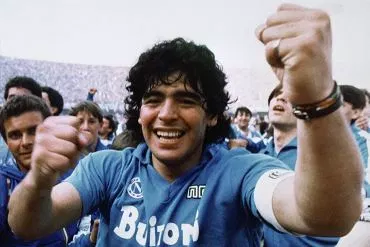For the opening night of the Sheffield Doc/Fest 2019 acclaimed filmmaker Asif Kapadia (Senna, Amy) introduced his latest documentary to the table: Diego Maradona. Comprised almost entirely of vast archive footage, it joins Kapadia’s other two documentaries; making the three projects into what could be described as a talent and trauma trilogy. All three films feature an iconic figure, a rise to fame, and an eventual collapse of some sort — but this time — the film’s subject is very much still alive.
The colorful documentary is a brief history lesson on Argentinian footballer Diego Maradona’s most climactic moments both on and outside of the field. Any football fan knows of the mythical figure — more specifically, his infamous handball — but the film is rich and alive with a context that adds to any pre-existing notions of the legendary player. While it’s not the most dynamic or intimate of portraits, it does allow you to feel like you’re in the very stadiums being played on-screen; watching the rise and fall of a titan. With the amount of different footage used, sourced from multiple countries, it goes without saying the editing cuts are most impressive.
The sound design and music elevate the footage marvelously. The enhanced tackles and cheers during matches make full use of the natural energy of the sport, which by the end feels essential in making Diego Maradona the visceral experience it is — despite the fact it’s not well-preserved footage. The old video format may not be the sharpest, but it has an epic historic charm. The crowds battle to get a touch of him, the camera lights flash at the top of staircases, and the thousands of people in the stands chant his name; it’s thunderous.
The film isn’t much concerned about painting Maradona as a hero or villain, it instead humorously puts together a picture of how fans viewed him. I’ll never forget the Italians referring to him as a God, or when they called him the devil once the relationship went sour. The outside perception is a large part of the proceedings, it has to be because self-reflection is apparently not Maradona’s strong suit. Diego as a person gets lost in his own cinematic story (he is at times frustrating and unreachable), but there’s a sweet irony to that fact, considering Maradona makes a point of how the grounded part of him faded away with every paycheque.
Maradona is not a simple man, so the character insights in the film are relatively distant. He denies knowledge of a son he fathered, cheats on his now-ex partner (who took months of convincing to come aboard the film), and inspired hatred for all the wrong reasons. See, it wasn’t the lies, drugs, or mob ties that turned the city of Naples against Maradona, it was the fact he scored a goal against their national team. This perhaps speaks to the violent and hateful part of the game (which the film doesn’t shy away from), but it also touches upon the very essence of Maradona as a man and by extension the film; he was his talent. His life revolved around Sunday matches, he felt most worthy when scoring goals, and was a mess outside of his so-called God-given skills on the ball.
When Kapadia was asked about whether Maradona expressed any regret for his actions during his interview, Kapadia’s simple “not really” response affirmed everything we’d watched — that sometimes a person’s existence as an icon takes over their humble roots. But Kapadia rightly went on to say that part of what makes characters such as this one so fascinating is the inability to pin them down. Diego Maradona won’t be the most satisfying watch of the year, but it’s a greatly balanced tale of awe and woe that invites you to step into a time capsule. There are a number of famous footballers today, but it’s doubtful anyone will ever reach the mythical status Maradona obtained ever again.
★★★ ½
To help us continue to create content, please consider supporting us on Kofi.


